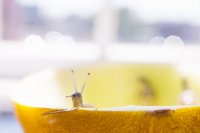lindsay
Member
Aww...the snail is so cool looking. Thanks for sharing your experiment with us. :)
This reminds me of the kids I used to take care of. The oldest daughter caught a beautiful monarch caterpillar, and it would go through milkweed like crazy and poop a LOT of little green pellets.
Out of curiosity, did you cut up any of the produce or did you put it all in the tank whole with rinds intact? I ask because when you cut open things like fruit, you are activating their natural enzymes to break down the flesh.
Thank you! They are beautiful creatures. The whole pet thing was on accident. I picked up a pretty shell one day (which went missing in our apt. for a month) and then found two more - was planning to make earrings and then one morning the shell began walking toward me as I was drinking my coffee. I was so intrigued by it, and saddened when I saw them getting crushed under peoples' feet in front of the garden), that I kept the 6 I found on the sidewalk. Then I found ten more in the spring and they began making babies. Yikes!
I am sure monarch caterpillars must be so interesting to watch! If they poop like a snail, I imagine it's a lot of poop!
Regarding your question about fruit and produce, I cut everything open so the snails can access it. The lettuce leaves I just put in there and spritz lightly with water - I'm not sure they would do so well if submerged in a warm environment. Kale maybe, but probably not romaine. However, basil leaves sitting in the damp soil are surprisingly resistant to mold. I peel the potatoes too - they didn't have much interest in the peel. The watermelon I put in with part of the rind. They like the watery-ness of the melon, but the initial face they make when they touch the juice makes me think it stings them or something. The younger ones seem to like sweet foods more than the adults, which makes sense.


